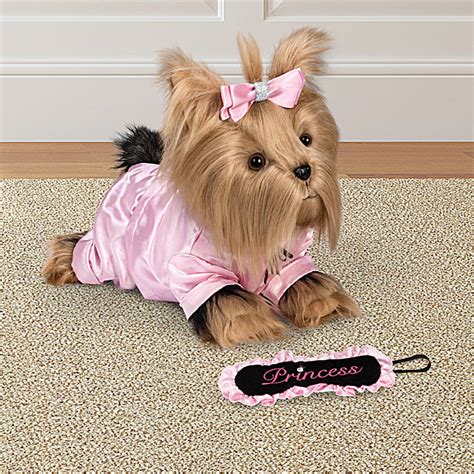Yorkie Winter Care Essentials: Keeping Your Pup Warm and Cozy
Yorkshire Terriers, with their delicate frames and luxurious long coats, require special attention during the colder months. As loving pet parents, it’s our responsibility to ensure our Yorkies stay warm, comfortable, and healthy throughout winter. This comprehensive guide will address common concerns and provide essential tips for keeping your Yorkie safe and happy during the winter season.
From understanding their vulnerability to cold temperatures to choosing appropriate clothing and providing cozy shelter, we’ll delve into everything you need to know to make winter a delightful experience for your furry friend.
Let’s dive into the details and equip ourselves with the knowledge to ensure our Yorkies thrive even in the harshest winter conditions.
How cold is too cold for Yorkies?
Yorkshire Terriers are known for their long, flowing coats, but their small size makes them susceptible to cold temperatures. Unlike larger breeds with thicker fur, Yorkies struggle to maintain their body heat in freezing weather. The general rule of thumb is that if you’re feeling cold, chances are your Yorkie is feeling it even more.
While a few minutes of exposure to cool temperatures might not pose a significant risk, prolonged exposure to cold can lead to hypothermia. Hypothermia occurs when the body loses heat faster than it can produce it, leading to dangerously low body temperatures. This can happen quickly in small breeds like Yorkies, especially if they are wet or exposed to wind and rain.
Here’s a quick breakdown of how cold is too cold for Yorkies:
- Below 45°F (7°C): Consider limiting outdoor time and providing warm shelter. If your Yorkie starts shivering uncontrollably, bring them indoors immediately.
- Below 32°F (0°C): Avoid prolonged outdoor exposure. Ensure your Yorkie is bundled up with appropriate winter wear.
- Below 20°F (-7°C): This temperature is considered extremely dangerous for Yorkies. Limit outdoor activities and ensure they have access to a heated space.
It’s important to monitor your Yorkie for signs of hypothermia, including shivering, lethargy, weakness, and confusion. If you notice any of these signs, seek veterinary attention immediately.
What are the best winter clothes for a Yorkie?
Just like we bundle up in layers during winter, our Yorkies need proper clothing to stay warm. Choosing the right winter wear for your Yorkie depends on factors like the severity of the weather and your pup’s individual needs.
Here are some essential winter clothing items for Yorkies:
- Sweater or Hoodie: A soft, warm sweater or hoodie provides basic insulation and keeps your Yorkie’s core body temperature stable. Look for materials like fleece or wool to retain heat effectively.
- Coat or Jacket: For colder weather, a waterproof and windproof coat or jacket with a warm lining is ideal. These garments provide extra protection from the elements and prevent your Yorkie from getting wet and chilled.
- Boots: If you live in an area with snow or ice, boots can protect your Yorkie’s paws from harsh conditions. Look for boots with good traction to prevent slipping and falling.
- Dog Mittens: For extreme cold, dog mittens can protect your Yorkie’s ears and paws from frostbite. These are particularly important for breeds like Yorkies with exposed ears and delicate paws.
When choosing winter wear for your Yorkie, ensure the garment fits snugly without restricting movement. Avoid anything too loose or too tight, as it can cause discomfort and restrict circulation. Remember to check the garment regularly for wear and tear and replace it when necessary.
Do I need to bathe my Yorkie in winter?
While keeping your Yorkie clean is important, bathing them too frequently during winter can strip their natural oils and leave them vulnerable to cold and dry skin. Yorkies have delicate skin that can easily become irritated, especially in harsh weather conditions.
Here’s a general guideline for bathing your Yorkie in winter:
- Reduce bathing frequency: Aim for a bath every 4-6 weeks, or only when necessary. You can use a gentle, moisturizing shampoo specifically designed for dogs.
- Avoid hot water: Use lukewarm water to prevent drying out their skin. Make sure the water temperature is comfortable for your Yorkie.
- Thorough drying: After bathing, dry your Yorkie thoroughly with a towel and consider using a hairdryer on a low setting. Avoid using a hot setting as it can damage their skin.
- Moisturize their skin: After a bath, apply a dog-safe moisturizer to help keep their skin hydrated and prevent dryness.
If you notice any signs of dry, flaky skin, excessive itching, or redness, consult your veterinarian. They can recommend a specific treatment plan to address the issue.
How can I keep my Yorkie warm inside?
While your Yorkie may be content with a cozy bed, you can create a warm and inviting indoor space for them to relax and enjoy themselves. Consider these tips:
- Provide a warm bed: Choose a soft, insulated dog bed and place it in a draft-free area. Consider adding a heated pad for extra warmth, especially during extremely cold weather.
- Create a warm corner: If your Yorkie prefers a spot on the floor, create a cozy corner by placing a thick blanket or rug. This provides extra insulation and warmth.
- Keep the house warm: Ensure the house is well-heated to maintain a comfortable temperature. However, avoid over-heating, as it can make your Yorkie uncomfortable.
- Limit drafts: Close windows and doors to prevent cold drafts from entering the house. You can also use curtains or blankets to block drafts.
Remember, Yorkies can be very sensitive to changes in temperature, so it’s important to maintain a consistent indoor environment. Avoid placing their bed near radiators or heaters, as this can be dangerous.
What are the best ways to exercise my Yorkie in winter?
While exercising your Yorkie is crucial, it’s essential to adjust routines during winter. The cold weather can make them more susceptible to illnesses, so it’s important to exercise them in a way that minimizes their exposure to harsh conditions.
Here are some winter-friendly exercise ideas for your Yorkie:
- Short walks: Opt for shorter walks and avoid prolonged exposure to cold and windy conditions. Dress your Yorkie in appropriate winter wear to keep them warm.
- Indoor playtime: Engage in indoor playtime with games, puzzles, and interactive toys to keep your Yorkie mentally and physically stimulated. This can help them burn off energy without needing long walks.
- Doggy daycare: If you’re concerned about providing enough exercise during winter, consider doggy daycare. This allows your Yorkie to socialize with other dogs and enjoy playtime in a controlled environment.
- Indoor agility: Set up a small agility course indoors to provide your Yorkie with a fun and engaging workout. You can use household items like pillows, blankets, and boxes to create obstacles.
Remember to avoid strenuous exercise in extremely cold weather. If your Yorkie starts shivering uncontrollably, stop the activity and bring them indoors to warm up.
How can I protect my Yorkie’s paws from the cold?
Yorkies have delicate paws that are prone to frostbite and other winter-related injuries. It’s crucial to protect their paws from harsh conditions like snow, ice, and salt.
Here’s how you can protect your Yorkie’s paws in winter:
- Paw balm: Apply a dog-safe paw balm to their paws before going outside. This creates a protective barrier against the elements and helps prevent dryness and cracking.
- Paw wax: Paw wax is a thicker barrier that provides extra protection for paws exposed to harsh conditions. It’s particularly helpful in snowy or icy areas.
- Boots: Dog boots with good traction are essential in snowy or icy conditions. They protect paws from the cold, snow, and ice, and prevent slipping and falling.
- Wipe paws after walks: After walks, wipe your Yorkie’s paws with a warm, damp cloth to remove any salt, ice, or debris. This helps prevent paw irritation and discomfort.
- Inspect paws for injuries: Regularly inspect your Yorkie’s paws for signs of cracking, redness, or swelling. These could indicate frostbite or other winter-related injuries. If you notice any issues, seek veterinary attention immediately.
By taking these precautions, you can ensure your Yorkie’s paws stay healthy and comfortable throughout winter.
What are the signs of a Yorkie getting cold?
While most dogs shiver when they’re cold, Yorkies have a smaller body mass and might not shiver as noticeably. However, there are other telltale signs that your Yorkie might be feeling the chill:
- Lethargy: Your usually active Yorkie might become sluggish and less playful.
- Huddle up: They might try to cuddle up to you or other warm objects to conserve heat.
- Whining or whimpering: This could be a sign of discomfort or pain associated with being cold.
- Shaking: While not as pronounced as shivering, a subtle tremor might indicate coldness.
- Pale gums: Their gums might turn pale, which could indicate reduced blood flow due to cold.
If you notice any of these signs, bring your Yorkie indoors immediately and provide them with warm shelter and a warm blanket. If their condition doesn’t improve, contact your veterinarian for further advice.
How can I keep my Yorkie’s coat healthy in winter?
Yorkies have long, silky coats that require regular grooming to maintain their health and shine. During winter, it’s even more crucial to keep their coat in good condition to provide adequate insulation and protect them from the cold.
Here are some tips for maintaining your Yorkie’s coat in winter:
- Regular brushing: Brush your Yorkie’s coat daily to remove tangles, mats, and shed hair. This helps prevent matting, which can trap cold air and reduce their natural insulation.
- Avoid over-bathing: As mentioned earlier, frequent bathing can strip their coat of its natural oils. Bathe them only when necessary.
- Use a moisturizing shampoo: If you do need to bathe your Yorkie, use a gentle, moisturizing shampoo specifically designed for dogs. This helps prevent dryness and maintain their coat’s health.
- Conditioner: Consider using a leave-in conditioner after bathing to add moisture and shine to their coat. This can help keep their coat soft and manageable during winter.
- Avoid over-drying: While drying their coat thoroughly is essential, avoid using a hairdryer on a high setting as it can damage their coat.
A healthy coat is essential for keeping your Yorkie warm and comfortable in winter. By following these tips, you can ensure their coat stays in optimal condition throughout the colder months.
What are the signs of hypothermia in Yorkies?
Hypothermia is a serious condition that occurs when a dog’s body temperature drops dangerously low. It can be fatal if left untreated, especially in small breeds like Yorkies. It’s crucial to be aware of the signs of hypothermia and act quickly if you suspect your Yorkie is suffering from it.
Here are the most common signs of hypothermia in Yorkies:
- Shivering: This is a classic sign of hypothermia. Your Yorkie might shiver uncontrollably, even in warm conditions.
- Lethargy: Your Yorkie might become sluggish, weak, and less responsive to your commands.
- Weakness: They might have difficulty walking or standing.
- Pale gums: Their gums might turn pale, indicating reduced blood flow.
- Confusion: They might seem disoriented or confused.
- Slow breathing: Their breathing might become slow and shallow.
- Low body temperature: If you have a thermometer, you can check their body temperature. A normal temperature for a dog is between 100.5°F and 102.5°F. A temperature below 100°F indicates hypothermia.
If you notice any of these signs, act quickly to warm your Yorkie up. Bring them indoors immediately and wrap them in a warm blanket. You can also use a warm water bottle or heating pad wrapped in a towel to provide additional warmth. Seek veterinary attention immediately for proper diagnosis and treatment. Early intervention is crucial for saving a Yorkie suffering from hypothermia.
What are some other tips for winterizing your Yorkie?
Beyond the basics, there are a few additional tips that can enhance your Yorkie’s winter comfort and safety:
- Keep them hydrated: During winter, it’s important to ensure your Yorkie stays hydrated. Offer them fresh water throughout the day and consider adding a few drops of bone broth to their water to encourage them to drink more.
- Avoid ice and salt: Keep your Yorkie away from areas with ice and salt, as these can irritate their paws. If you have to walk them on icy pavements, consider using dog boots to protect their paws.
- Be mindful of antifreeze: Antifreeze is highly toxic to dogs. Keep it out of reach and be aware of any spills, as your Yorkie might be tempted to lick it.
- Car safety: Never leave your Yorkie unattended in a car during winter. The temperature inside a car can drop quickly, even on a relatively warm day. This can lead to hypothermia or heatstroke.
- Routine vet checkups: Schedule regular veterinary checkups to ensure your Yorkie is healthy and up-to-date on vaccinations. This is especially important during winter, as their immune system might be more vulnerable.
By taking these precautions and providing proper care, you can ensure your Yorkie enjoys a safe and comfortable winter season.
Table Summarizing Key Information
| Topic | Key Points |
|---|---|
| Temperature Tolerance | Yorkies are sensitive to cold; below 45°F, limit outdoor time; below 32°F, use winter wear; below 20°F, avoid outdoor exposure. |
| Winter Clothing | Sweaters, coats, boots, and mittens offer protection; ensure snug fit, check for wear and tear. |
| Bathing | Reduce frequency to 4-6 weeks; use lukewarm water, gentle shampoo, and dry thoroughly. |
| Indoor Comfort | Provide warm bed, cozy corner, maintain comfortable indoor temperature, and avoid drafts. |
| Exercise | Short walks, indoor playtime, doggy daycare, and indoor agility help maintain fitness. |
| Paw Protection | Paw balm, paw wax, boots, wipe paws after walks, and inspect for injuries. |
| Hypothermia | Shivering, lethargy, weakness, pale gums, slow breathing, and low body temperature are signs; seek immediate veterinary attention. |
| Coat Care | Brush daily, avoid over-bathing, use moisturizing shampoo and conditioner. |
| Additional Tips | Keep hydrated, avoid ice and salt, be mindful of antifreeze, car safety, routine vet checkups. |
Frequently Asked Questions
How do I know if my Yorkie is cold?
Yorkies might not shiver as noticeably as larger dogs, but they can show other signs of being cold, including lethargy, huddling up, whining, shaking, pale gums, and slow breathing. If you notice any of these signs, bring your Yorkie indoors immediately.
Is it okay to shave my Yorkie’s coat in winter?
No, it’s not recommended to shave your Yorkie’s coat in winter. Their long coat provides natural insulation, and shaving it can make them more vulnerable to the cold. Instead, focus on regular brushing and keeping their coat clean and healthy.
What should I do if my Yorkie gets frostbite?
Frostbite is a serious condition that occurs when skin is exposed to extreme cold. If you suspect your Yorkie has frostbite, seek veterinary attention immediately. Treatment typically involves warming the affected area slowly and gently.
Can I use a human sweater on my Yorkie?
It’s not recommended to use human sweaters on your Yorkie. Human clothing is often made of materials that are too loose or too tight for dogs and can restrict their movement. It’s best to use dog-specific clothing designed for their size and body shape.
How often should I feed my Yorkie in winter?
You should continue feeding your Yorkie their regular diet in winter. However, they might need slightly more food to maintain their energy levels, especially if they are more active indoors. Consult your veterinarian to determine the right amount of food for your Yorkie.
Should I use a heated pad for my Yorkie in winter?
Heated pads can be helpful in keeping your Yorkie warm, but it’s crucial to choose a pad designed for dogs and use it safely. Avoid using pads that are too hot, and supervise your Yorkie while they are using it. Always check for any signs of burns or discomfort.
What are some winter-safe activities I can do with my Yorkie?
There are plenty of winter-safe activities you can enjoy with your Yorkie, including indoor playtime, puzzles, agility courses, and walks in well-plowed areas. Avoid activities that expose them to extreme cold or icy surfaces.


